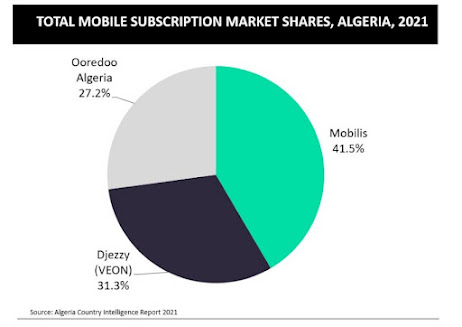Algeria has a well developing telecom infrastructure with growth encouraged by sympathetic government policies and regulations aimed at delivering serviceable internet connections across the country. However fixed internet speeds remain slow, and the country ranks poorly in international tables. Some efforts are ongoing to address this, with the government having pressed Algérie Télécom in early 2021 to increase the minimum rate available from 4Mb/s to 10Mb/s.
Mobile broadband is largely based on 3G and LTE, and the data rates are also low in global terms. Although LTE is available in all provinces, much investment is required from the MNOs to improve the quality of service. The government is encouraging the MNOs to undertake upgrades to LTE infrastructure before investing in commercial 5G services.
Intensifying price competition between the three MNOs: Djezzy, Mobilis and Ooredoo Algeria – together with increases in taxes on voice and data services, have had a negative effect on operator revenue. The difficult operating climate encouraged VEON to sell its entire share in Djezzy in mid-2021, allowing it to focus on its more profitable markets.
Djezzy is the brand under which Optimum Télécom is marketing its mobile offer.
Djezzy broadcasts 2G on 900 MHz and 3G up to HSPA+ on 2100 MHz in 48 Wilayas. 4G/LTE was launched in 2016 on 1800 MHz (band 3) and is available in most Wilayahs. Djezzy is the most popular brand amongst young people with the most aggressive marketing and generally on par with Mobilis.
Coverage in cities is good, while outdoors on 4G/LTE, but often falls back to 3G indoors. Rural coverarge ranges from 3G to sometimes EDGE or no service. Speeds on 4G/LTE ranges between 10 and 20 Mbps to occasionally poor or trouble connecting to some websites. Overall, connectivity is fairly reliable, though.
Mobilis is the brand under which the mobile subsidiary of state-owned Algérie Télécom is marketing its mobile offers. Based on the number of subscribers it's currently the market leader in the country and was launched in 2003.
Mobilis has been offering 3G connection in basically 80% of all the cities and towns since 2012. 4G/LTE was launched in October 2016 on 1800 MHz (band 3). 4G/LTE is available in the Wilayas of Tlemcen, Constantine, Batna, Bordj Bou Arreridj, El Oued, Biskra, Boumerdès, Tipaza, Blida, Tizi-Ouzou et Sidi Bel-Abbès.
The third operator in number of users in Algeria is Ooredoo and used to be called Nedjma before. It's now owned by an international telco based in Doha, Qatar.
Just like the other Algerian operators they operate 2G on 900 and 1800 MHz, 3G on 2100 MHz and since end of 2016 on 4G/LTE on 1800 MHz (band 3) as well. Ooredoo covers with 3G most populated areas in Algeria and 28 out of 48 Wilayahs are covered with 4G so far.
Algeria’s telecoms regulator has issued additional spectrum in the 900MHz band to the country’s three mobile operators. ARPCE (Authority for Regulation of Post and Electronic Communications / Autorite de Regulation de la Poste et des Communications Electroniques) granted spectrum in the E-GSM band (880MHz-890MHz/925MHz-935MHz) to Djezzy, Mobilis and Ooredoo.
In a statement, the regulator said that the spectrum was to be used for “improving the quality of service of mobile telephony networks”, and noted that it would “continue its efforts in the planning and assignment of frequencies, in order to offer the best quality of service to users.”
The Algerian government said earlier this year they aim to ensure the launch of 5G mobile networks ‘soon’ and is currently working on freeing up and optimising the requisite radio frequency spectrum. Telecoms minister Karim Bibi Triki announced that the 5G initiative – forming part of efforts to meet growing demand for broadband connectivity – was not previously prioritised by the government due to more pressing needs to improve poor 4G coverage and service quality in some parts of Algeria, but he indicated that the telecoms sector could now be aiming for a commercial 5G launch by the end of 2022.
Since 2020 the COVID-19 pandemic influenced all Algerian operators to bolster their networks to cope with greater internet traffic demands, leading to ‘5G-ready’ technology deployments, with state-backed operator Mobilis having begun 5G testing and rollout of 5G-ready infrastructure in partnership with Huawei, whilst rival operators Djezzy and Ooredoo have formed respective next-generation technology partnerships with Nokia and Ericsson. Furthermore, high speed fibre-optic backbone expansions in the country will help support the introduction of fifth-generation mobile services, with an existing 200,000km of state-owned fibre cable alone. During 2021 Algerian operators requested that the government clarify its 5G strategy to allow them to plan their future investments.
Related Posts:
- Operator Watch Blog: Algeria - Growth and Competition in North Africa



No comments:
Post a Comment